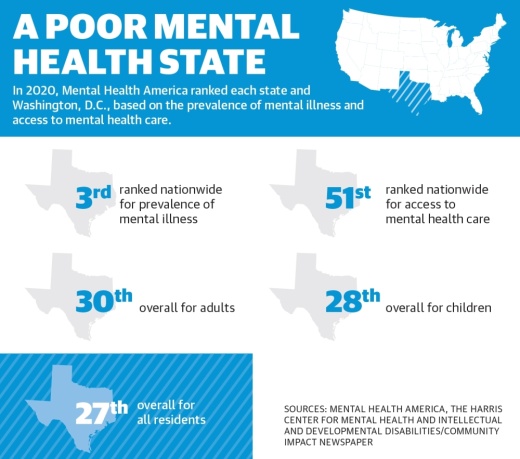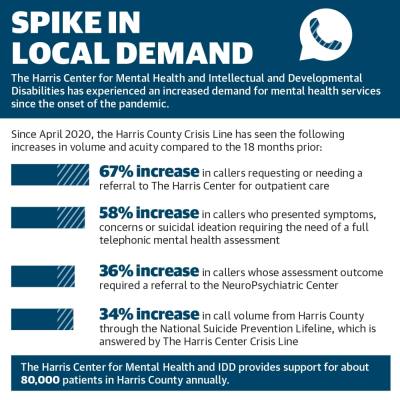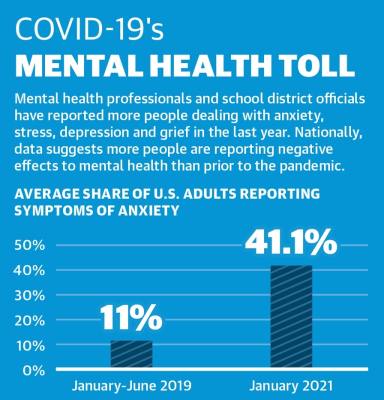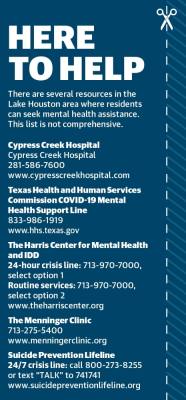In 2020, Mental Health America ranked each state and Washington, D.C., based on the prevalence of mental illness and access to mental health care. Although Texas ranked 27th overall and was third in prevalence of mental illness, the state ranked 51st for access to care.
Local experts said access to mental health care has been an issue in Texas since long before the pandemic. In 2017, Mental Illness Policy Org. reported the state allocated 1.2% of its total state expenditures to mental illness; this compares with states on the higher end of spending, such as Arizona, Pennsylvania and Maine, which allocated 4.8%-5.6% of their expenditures to mental illness.
“COVID-19 has challenged and changed mental health services, [and] unfortunately the mental health care system[s] in Houston and Texas proper were already inferior to many other states prior to the pandemic,” said Dr. Jon Stevens, vice president of growth and innovation for The Menninger Clinic, a Houston-based psychiatric facility. “Although the true psychological effects may not be known for years and perhaps generations, for many, this has been the most challenging event of a lifetime.”
As a result, Spring- and Klein-area mental health care providers, including The Harris Center for Mental Health and Intellectual and Developmental Disabilities, as well as local school districts are struggling to keep up with an increased demand for mental health services.
Breaking point
The Harris Center supports about 80,000 primarily underinsured or uninsured patients annually with everything from outpatient services to crisis intervention. Since the pandemic’s onset, officials said they have experienced a significant increase in demand for services.
According to data from The Harris Center, since April 2020, the center’s crisis line has experienced a 58% increase in callers who presented symptoms, concerns or suicidal ideation requiring a telephonic mental health assessment as well as a 34% increase in the call volume from Harris County residents through the National Suicide Prevention Lifeline.
“The mental health impact of COVID-19 has touched almost every family in this country over the last 18 months. In fact, over 40% of Americans report symptoms of anxiety or depressive disorder right now,” The Harris Center CEO Wayne Young said at an Oct. 26 press conference.
Dr. Luming Li—who joined The Harris Center as its chief medical officer in early August—said prolonged isolation, economic challenges and delaying seeking treatment due to COVID-19 concerns have all played a factor in the spike in demand.
“We’ve seen increases in acuity in the individuals that are being served, and one can surmise that it’s because they didn’t seek care early enough or they waited for a while until their condition got significantly worse, so they’re coming in at a worse state than what we were seeing pre-pandemic,” Li said.
Similarly, local school districts officials said they have experienced a higher prevalence of mental health concerns on campus.
“There has been a significant increase in the demand for mental health services among staff and students. Staff and students have been experiencing mental health concerns, including depression and anxiety,” said Dr. Crystal Collins, director of guidance, counseling and mental health for Spring ISD.
Combined with limited funding, resources and increasingly burnt-out staffs, Li said meeting the increased demand for mental health services over the past 18 months has required providers to get creative.
Meeting needs
Like many health care providers, The Harris Center has relied heavily on technology throughout the pandemic. At The Harris Center, Li said telehealth has enabled many patients to seek treatment from the safety of their homes, although it does not come without challenges.
“People are sharing some concerns about coming to the clinic, so they’ve been really happy being able to use telehealth to receive services. But with telehealth, you’re not able to provide lab work or do physical exams, so that’s a concern,” Li said.
According to Director of Communications Karen Boren, The Harris Center received $15.9 million in COVID-19-related state and federal funding throughout fiscal years 2020 and 2021, which the entity used to establish a COVID-19 mental health support line, among other investments.
“This was a direct response to COVID-19 just because we saw an influx in mental health-related crisis calls to our crisis line,” Boren said.
Additionally, The Harris Center is using funds to help stabilize its workforce by bolstering staff pay and implementing incentives.
“There’s no fighting the fact that the health care workforce is feeling burnt out because they’re having to spend long hours away from family and friends when they’re under quarantine,” Li said.
Most recently, Harris County commissioners approved a three-year agreement with The Harris Center on Oct. 26 to develop and implement a new community-initiated mental health care program known as Healthy Minds, Healthy Communities.
“The community-initiated care model is not dependent upon licensed clinicians but instead engages in mental health promotion, prevention and low-intensity interventions delivered by nonspecialized but trained health care workers and lay members of the community,” Young said.
The roughly $8.93 million program, funded through American Rescue Plan Act dollars, will focus on 10 ZIP codes totaling about 300,000 residents who have been identified as being disproportionately affected by COVID-19 and suicide, and who have a lower utilization of behavioral health care services. Among the 10 identified ZIP codes, 77090, 77091 and 77038 are located within Precinct 4.
On-campus response
To better meet the mental health needs of students and staff, local school districts have also invested in programming.
In Klein ISD, district officials are partnering with The Harris Center this fall to train all school counselors in Youth Mental Health First Aid, which aims to support students who are facing mental health challenges or crises on campus.
“We look forward to expanding this training to include teachers and other campus staff this year,” said Kayla Shaw, instructional officer for counseling and whole student wellness at KISD.
The district is also partnering with The Harris Center later this school year to host a parent session designed to equip families with tools to support and recognize mental health needs in their children.
In SISD, Collins said the district has received additional funding to help with mental health services which has been used to invest in nine new Communities in Schools student support specialists, at-risk counselors and social-emotional learning programs. Communities in Schools is a nonprofit that works within public and charter schools to help at-risk students stay in school and perform well.
“Research has shown that promotion of good mental health and prevention before or at the onset of mental health disorder improves outcome,” Collins said. “SISD wants to expand on our mental health interventions and programs so that our focus is on more proactive prevention addressing mental health concerns.”
In Cy-Fair ISD, Frank Sampson, director of guidance and counseling, said the district recently produced a suicide prevention newsletter, acquired a therapy dog for one the district’s elementary campuses, and enhanced its staff wellness program and resource links. Just prior to the pandemic during the 2018-19 school year, CFISD also formed a Mental Health Intervention Team comprising two licensed psychologists, four licensed professional counselors and two CFISD mental health officers.
“The combination of these highly trained and experienced mental health professionals allows the team to provide a broad spectrum of responses in order to meet individual mental health needs across the district,” Sampson said.
Moving forward, Sampson said CFISD plans to expand student mental health alliances to all secondary campuses.








